Public Opinion Tracker Deep Dive: Perspectives of Black K-12 Parents (February 2021)
There is no question Black students and families in America are collectively experiencing learning disruptions differently than other groups.
Journalists have reported on particular mental and emotional challenges Black students face in K–12 education. Trust appears to be eroding between school officials, teachers, and Black families, and Black parents appear to be less trusting of school officials’ decisions around school re-openings.
Last month, Albany State University’s Center for Advancing Opportunity provided a series of snapshots detailing challenges Black students and families faced in 2020, but also highlighted ways they are overcoming those challenges. And over the past decade, online outlets expressing perspectives of Black parents and students have grown, such as Education Post, National Parents Union and 8 Black Hands. During the COVID-19 pandemic, survey researchers are finding that Black and white Americans tend to have distinctly different perceptions of problems and solutions related to K–12 education.
As of February, EdChoice decided to increase our sampling of Black K–12 school parents to better understand their unique perspectives, experiences, concerns and preferences. Those views—particularly when it comes to education and schooling—can be very unique compared to other groups in the country, and reflecting information from which we all can learn.
In the February wave of our monthly Public Opinion Tracker, we obtained completed surveys from 411 Black parents of school-aged children, which includes the aforementioned oversample of 300 Black school parents. We will compare their responses to those of the total sample of school parents in our monthly polling. Last month we received completed surveys from 1,100 K–12 school parents, which itself included an oversample of 700 parents. We plan to continue this oversampling approach for the rest of this year.
In a nutshell: We found Black parents were less comfortable with in-person schooling due to the pandemic. As others have also reported, Black respondents were less likely to seek COVID-19 vaccination for themselves or their children. Black parents show more interest in traditional homeschooling, hybrid schooling, learning “pods” and tutoring. They also demonstrate at least as much support for school choice policies as other demographics.
1. Fewer Black parents say they would vaccinate themselves or their children than white or Hispanic parents. Less than half of Black parents say they would receive an FDA-approved COVID-19 vaccine if given the option, 13 percentage points lower than white parents and seven points lower than Hispanic parents. Additionally, the share of Black parents saying they would vaccinate their children for COVID-19 is 6 points lower than the share saying they would vaccinate themselves. In comparison, the difference is just 1 point and 2 points in white and Hispanic parents, respectively.
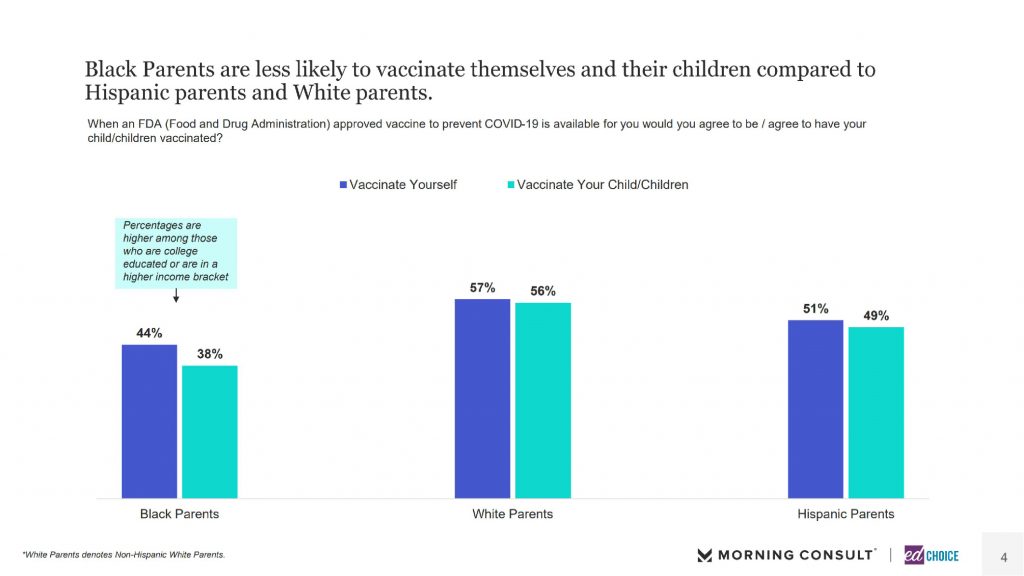
2. Black parents are significantly less comfortable with in-person education right now. While February saw half of all school parents say they were at least somewhat comfortable with in-person instruction for the first time since October, the share of Black parents saying they were comfortable is just over one-third. At 36 percent, total comfort among Black parents is 18 percentage points lower than white parents and 15 points lower than Hispanic parents.
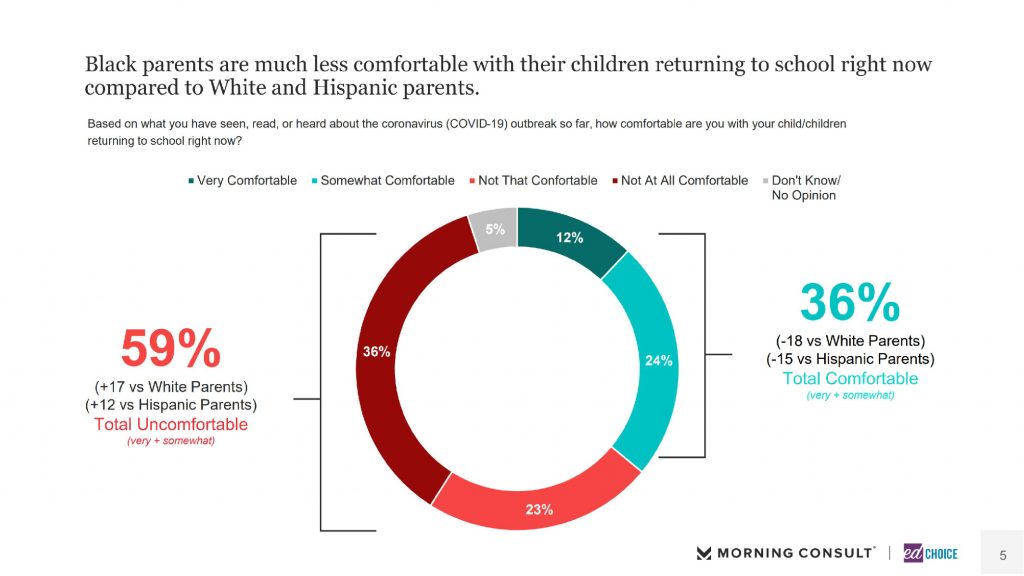
Most Black parents are pessimistic about in-person education being safe for children in the near future. A total of 20 percent thought schools would be safe by the end of the school year, compared to 32 percent of all school parents. Sixty-four percent of Black parents thought schools would not be safe until the 2021–22 school year, 14 percentage points higher than all school parents.
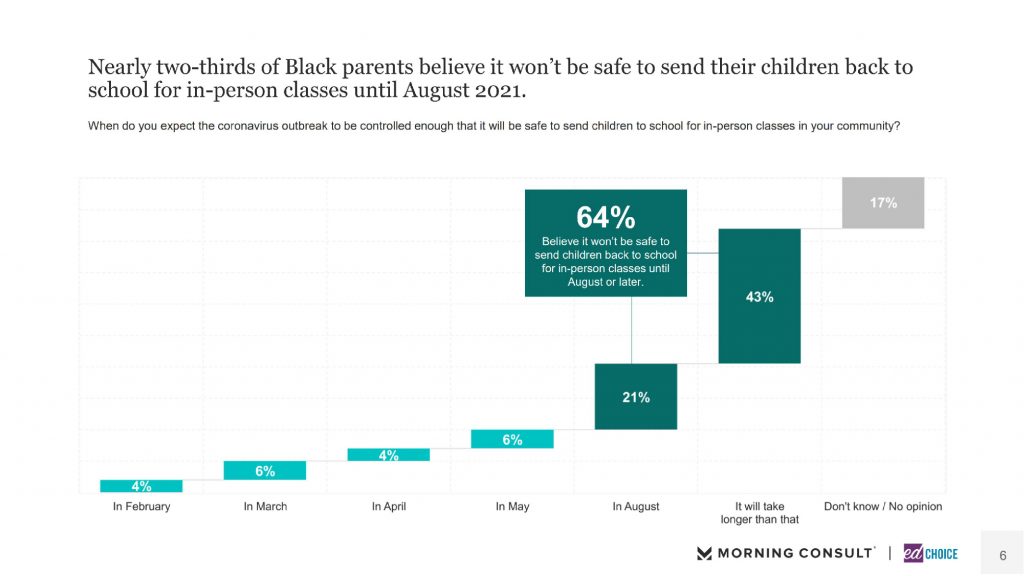
3. Black parents are noticeably less positive about their children’s academic and social development this school year. Just under a quarter of Black parents say their children are progressing in their academics “very well,” 4 percentage points lower than white parents and 13 points lower than Hispanic parents. Similarly, 21 percent of Black parents say their children’s social development is progressing very well, 3 points lower than white parents and 18 points lower than Hispanic parents. Strong positivity about their children’s emotional development is level with that of white parents but 12 points lower than that of Hispanic parents.
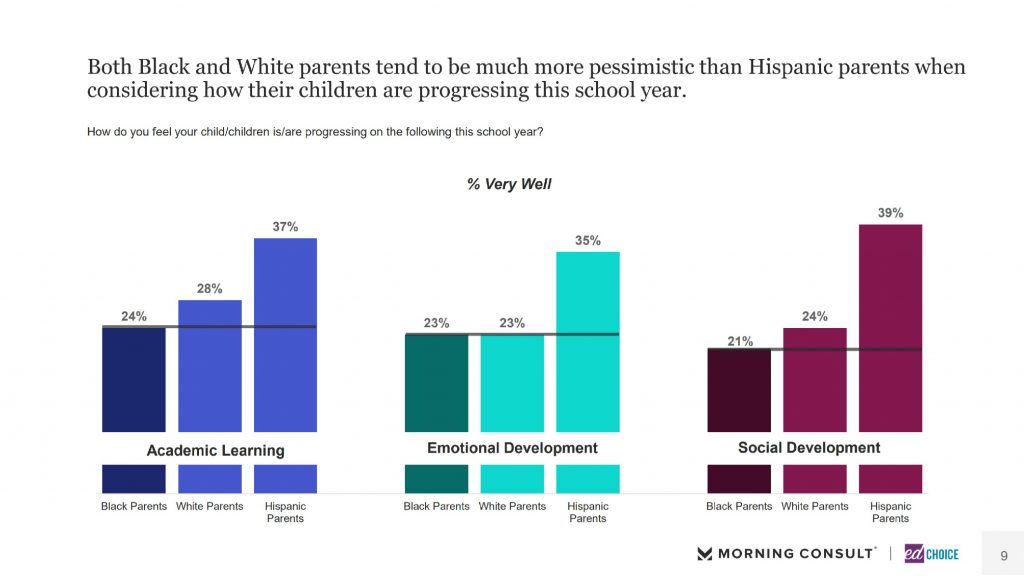
4. When asked about their post-pandemic schooling preferences, Black parents are more likely to prefer schooling completely at home and less likely to want schooling completely outside the home. The share of Black parents who would prefer schooling to happen entirely in the home exceeds that of white parents and Hispanic parents by 6 points and 5 points, respectively; furthermore, the share of Black parents preferring schooling completely outside the home is lower than that of white and Hispanic parents by 17 points and one point, respectively. A total of 50 percent of Black parents would prefer some mix of at-home and at-school education, compared to 41 percent of white parents and 56 percent of Hispanic parents.
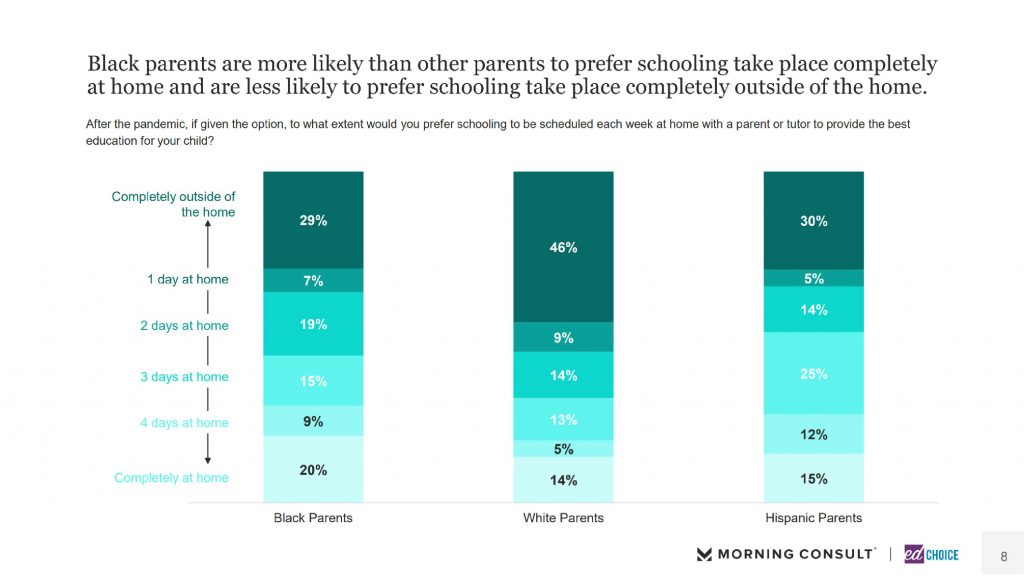
5. Black families are less likely to be participating in learning “pods” than all school parents, but they are more interested in starting or joining one. Compared to the 19 percent of all school parents saying their family is participating in learning “pods,” or “microschools,” 15 percent of Black parents say they participate in pods. However, 24 percent of Black parents say that, although they currently are not in a pod, they are looking to form or join one. That share is nine percentage points higher than that of all school parents. Like the broader parent population, Black families in or interested in pods are more likely to have middle- or higher-incomes, and they are less likely to attend a public district school.
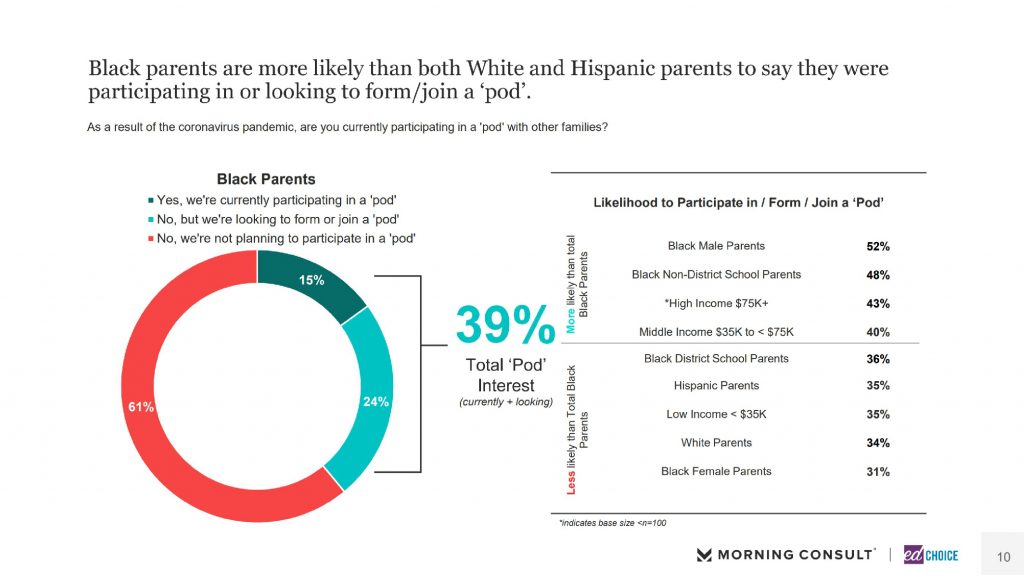
6. Black parents are more likely to currently seek tutoring for their children. While the share of parents saying their children are currently receiving tutoring is similar among Black, white, and Hispanic parents, Black parents are significantly more likely to say they are actively looking for tutoring for their children. A total of 33 percent of Black parents say they are not yet tutoring, but they are interested in receiving tutoring, compared to 20 percent of white parents and 36 percent of Hispanic parents.
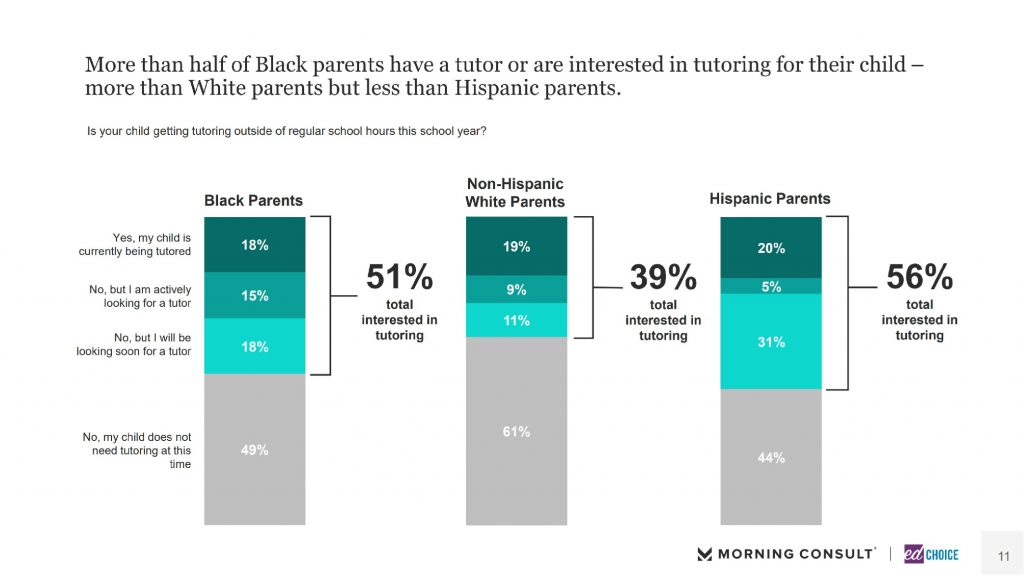
7. Black parents of special needs children are less likely to currently receive tutoring than other parents of special needs children despite overall interest being higher. Just under a quarter of Black parents of special needs children are currently receiving tutoring, compared to a third of white and Hispanic parents of special needs children. While 37 percent of Black parents of special needs children say they are not yet tutoring, but they are interested in receiving tutoring, only 20 percent of white and Hispanic parents of special needs children indicate the same. In other words, of the 53 percent of white and Hispanic parents of special needs children at least interested in tutoring, 62 percent are receiving it, but of the 61 percent of Black parents of special needs children interested in tutoring, just 39 percent are receiving it.
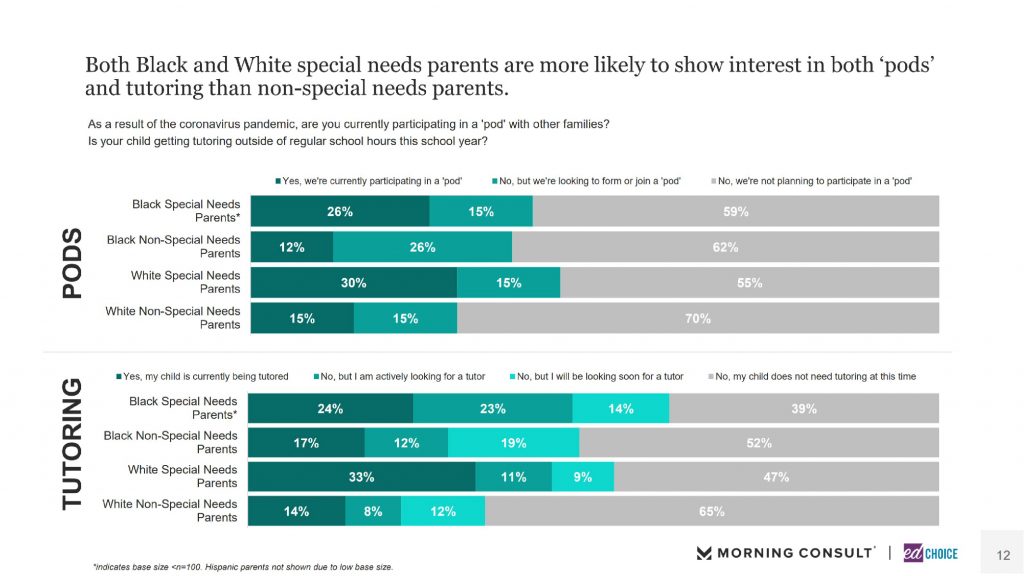
8. As with other parents, a significant majority of Black parents support school choice policies. Support for school choice policies looks fairly similar across Black, white, and Hispanic parents. Nearly two-thirds of Black parents support charter schools, though that number jumps to 74 percent if respondents see a definition of charters. Two-thirds of Black parents support education savings accounts (ESAs), but for respondents who see a statement explaining what ESAs are, support reaches 78 percent.
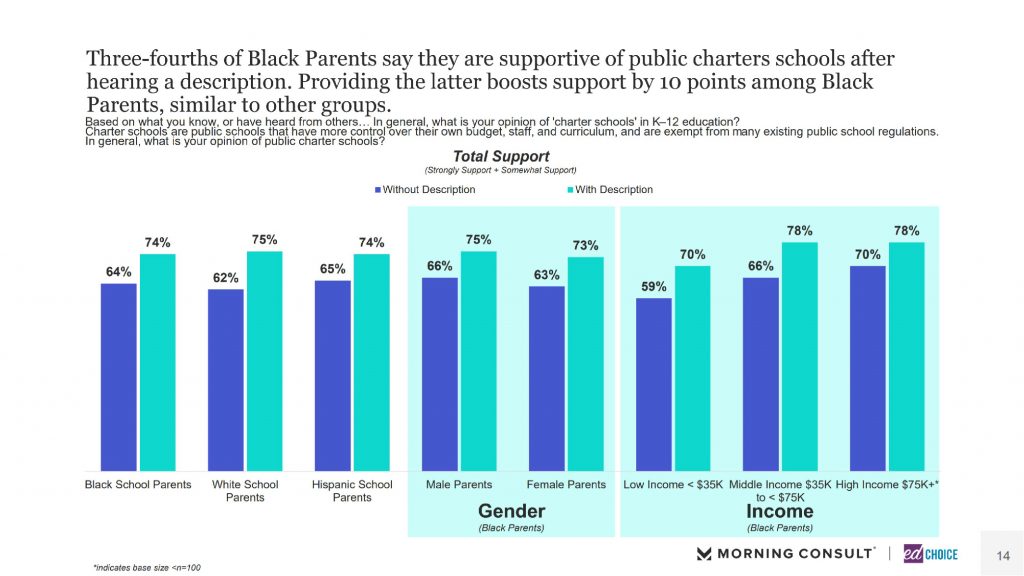
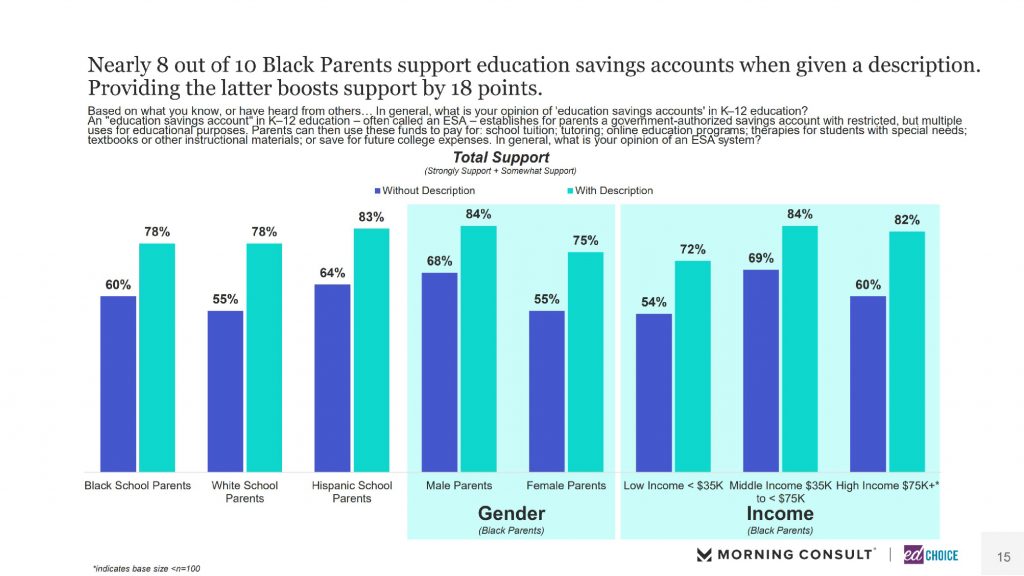
NOTE: A lot of organizations are doing excellent public opinion survey work on K–12 education developments and issues, especially during our turbulent times. We are cataloging those polls and surveys and you can visit our archive at this Google Sheets page. We update on a rolling basis as polls are released. Please don’t hesitate to let us know if we are missing any to date.




